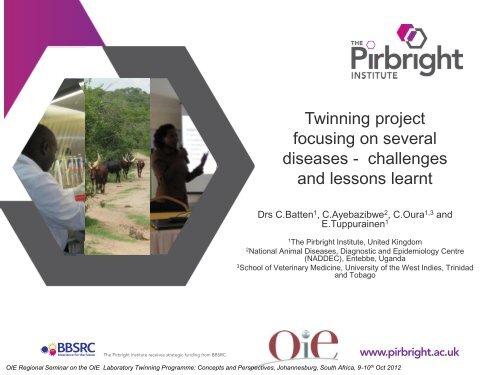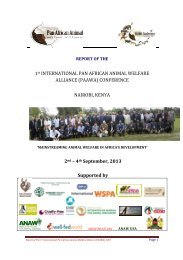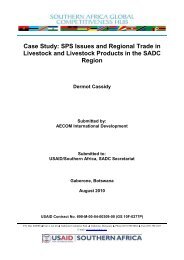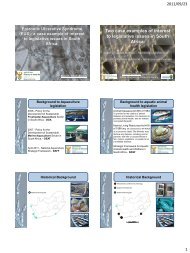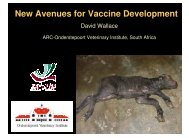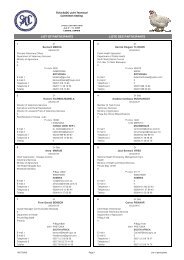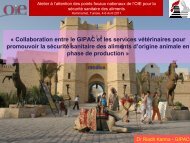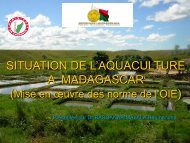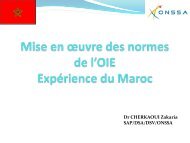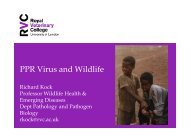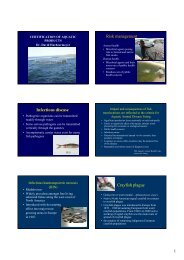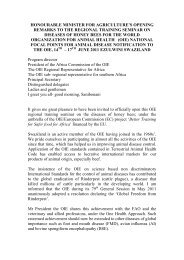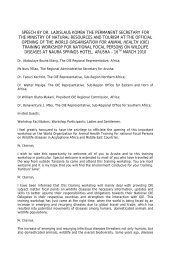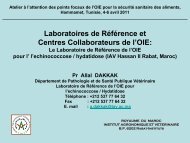Twinning project focusing on several diseases ... - OIE Africa
Twinning project focusing on several diseases ... - OIE Africa
Twinning project focusing on several diseases ... - OIE Africa
Create successful ePaper yourself
Turn your PDF publications into a flip-book with our unique Google optimized e-Paper software.
<str<strong>on</strong>g>Twinning</str<strong>on</strong>g> <str<strong>on</strong>g>project</str<strong>on</strong>g><br />
<str<strong>on</strong>g>focusing</str<strong>on</strong>g> <strong>on</strong> <strong>several</strong><br />
<strong>diseases</strong> - challenges<br />
and less<strong>on</strong>s learnt<br />
Drs C.Batten 1 , C.Ayebazibwe 2 , C.Oura 1,3 and<br />
E.Tuppurainen 1<br />
1<br />
The Pirbright Institute, United Kingdom<br />
2<br />
Nati<strong>on</strong>al Animal Diseases, Diagnostic and Epidemiology Centre<br />
(NADDEC), Entebbe, Uganda<br />
3<br />
School of Veterinary Medicine, University of the West Indies, Trinidad<br />
and Tobago<br />
<strong>OIE</strong> Regi<strong>on</strong>al Seminar <strong>on</strong> the <strong>OIE</strong> Laboratory <str<strong>on</strong>g>Twinning</str<strong>on</strong>g> Programme: C<strong>on</strong>cepts and Perspectives, Johannesburg, South <strong>Africa</strong>, 9-10 th Oct 2012
The Pirbright Institute<br />
• Pirbright Institute is <strong>OIE</strong>,<br />
FAO and European<br />
Community Reference<br />
laboratory for Foot and<br />
Mouth Disease<br />
• <strong>OIE</strong> reference laboratory for<br />
<strong>Africa</strong>n Swine Fever, sheep<br />
pox, goat pox and lumpy<br />
skin disease<br />
• FAO and <strong>OIE</strong> reference<br />
laboratory for Peste des<br />
Petits Ruminants (PPR)<br />
• <strong>OIE</strong> and European<br />
Community reference<br />
laboratory for Bluet<strong>on</strong>gue<br />
<strong>OIE</strong> Regi<strong>on</strong>al Seminar <strong>on</strong> the <strong>OIE</strong> Laboratory <str<strong>on</strong>g>Twinning</str<strong>on</strong>g> Programme: C<strong>on</strong>cepts and Perspectives, Johannesburg, South <strong>Africa</strong>, 9-10 th Oct 2012
<str<strong>on</strong>g>Twinning</str<strong>on</strong>g> between the Pirbright Institute<br />
and NADDEC<br />
• Goal is to establish the first <strong>OIE</strong> Reference<br />
Laboratory in the East <strong>Africa</strong>n regi<strong>on</strong><br />
• PPR, lumpy skin disease, sheep pox, goat pox, FMD<br />
and BT (<strong>OIE</strong> listed <strong>diseases</strong> in Uganda)<br />
• Diagnostic capacity and technical expertise are<br />
essential for the early detecti<strong>on</strong>, c<strong>on</strong>trol and<br />
surveillance of these <strong>diseases</strong><br />
• Covers the molecular and serological methods<br />
<strong>OIE</strong> Regi<strong>on</strong>al Seminar <strong>on</strong> the <strong>OIE</strong> Laboratory <str<strong>on</strong>g>Twinning</str<strong>on</strong>g> Programme: C<strong>on</strong>cepts and Perspectives, Johannesburg, South <strong>Africa</strong>, 9-10 th Oct 2012
Objectives<br />
• In general good progress<br />
• Provide training of Ugandan staff at Pirbright<br />
laboratory and <strong>on</strong> site in Entebbe<br />
• Set up diagnostic tests at NADDEC<br />
• Set up a sample management system<br />
• Set up a quality assurance system<br />
In this presentati<strong>on</strong> we will discuss the challenges<br />
we have met during this <str<strong>on</strong>g>project</str<strong>on</strong>g><br />
<strong>OIE</strong> Regi<strong>on</strong>al Seminar <strong>on</strong> the <strong>OIE</strong> Laboratory <str<strong>on</strong>g>Twinning</str<strong>on</strong>g> Programme: C<strong>on</strong>cepts and Perspectives, Johannesburg, South <strong>Africa</strong>, 9-10 th Oct 2012
Transfer of funds from the UK to<br />
Uganda<br />
• Most of the research institutes in the UK<br />
currently use a shared financial system (Shared<br />
Services Centre)<br />
• The transfer of m<strong>on</strong>ey is slow and payment for<br />
goods or services in Uganda has suffered<br />
serious delays<br />
• The payment process might be easier if a local<br />
bank account could be set up for the <str<strong>on</strong>g>project</str<strong>on</strong>g><br />
• Need to budget for additi<strong>on</strong>al costs: banking<br />
fees, customs charges<br />
<strong>OIE</strong> Regi<strong>on</strong>al Seminar <strong>on</strong> the <strong>OIE</strong> Laboratory <str<strong>on</strong>g>Twinning</str<strong>on</strong>g> Programme: C<strong>on</strong>cepts and Perspectives, Johannesburg, South <strong>Africa</strong>, 9-10 th Oct 2012
Ugandan staff visits in Pirbright<br />
• Planning of the visit must be started well in<br />
advance<br />
• Due to bio-security reas<strong>on</strong>s documentati<strong>on</strong><br />
required for a visitors to a high-c<strong>on</strong>tainment<br />
laboratory has substantially increased (security<br />
clearance, reference letters both from academics<br />
and employer, copy of passport in advance)<br />
• Visa applicati<strong>on</strong>s – not automatically granted,<br />
requirements by the immigrati<strong>on</strong> authorities<br />
• Visitors need to get a valid visitor visa depending<br />
<strong>on</strong> the durati<strong>on</strong> of the visit and if the work will be<br />
carried out inside the restricted area, check<br />
academic and business visa guidance<br />
• In some cases it has required <strong>several</strong><br />
applicati<strong>on</strong>s for <strong>on</strong>e pers<strong>on</strong>, each of which costs<br />
approximately £200<br />
<strong>OIE</strong> Regi<strong>on</strong>al Seminar <strong>on</strong> the <strong>OIE</strong> Laboratory <str<strong>on</strong>g>Twinning</str<strong>on</strong>g> Programme: C<strong>on</strong>cepts and Perspectives, Johannesburg, South <strong>Africa</strong>, 9-10 th Oct 2012
Laboratory tests<br />
• The twinning <str<strong>on</strong>g>project</str<strong>on</strong>g> focuses <strong>on</strong> the<br />
development, optimizati<strong>on</strong> and<br />
validati<strong>on</strong> of nucleic acid techniques<br />
(real-time PCR method)<br />
• When problems arise, expertise to<br />
correct the fault or obtain spare parts<br />
should be readily available – local<br />
technical assistance is not always<br />
available<br />
• If available simple “back up” tests<br />
should be set up (c<strong>on</strong>venti<strong>on</strong>al PCR)<br />
• In general, for any test used in the<br />
candidate lab, as many reagents as<br />
possible should be available through<br />
local suppliers – often challenging<br />
<strong>OIE</strong> Regi<strong>on</strong>al Seminar <strong>on</strong> the <strong>OIE</strong> Laboratory <str<strong>on</strong>g>Twinning</str<strong>on</strong>g> Programme: C<strong>on</strong>cepts and Perspectives, Johannesburg, South <strong>Africa</strong>, 9-10 th Oct 2012
Well characterized samples<br />
• The validati<strong>on</strong> of tests, to be used as positive and negative<br />
c<strong>on</strong>trols, for training purposes<br />
• Transfer of biological material: reference materials i.e. live<br />
viruses, sample panels and reference sera<br />
• Letter of undertaking from the recipient lab and import<br />
permit from the competent governmental authority in<br />
receiving country<br />
• Two export permits need to be applied from UK government<br />
for the export of live virus or infectious samples<br />
• Process usually takes approximately 2 to 3 m<strong>on</strong>ths<br />
• Need to use logistic companies specialized in the<br />
transportati<strong>on</strong> of dangerous goods<br />
• The ultimate aim is to generate a sample bank at NADDEC<br />
– create own reference materials<br />
<strong>OIE</strong> Regi<strong>on</strong>al Seminar <strong>on</strong> the <strong>OIE</strong> Laboratory <str<strong>on</strong>g>Twinning</str<strong>on</strong>g> Programme: C<strong>on</strong>cepts and Perspectives, Johannesburg, South <strong>Africa</strong>, 9-10 th Oct 2012
Sample collecti<strong>on</strong><br />
• In remote areas the c<strong>on</strong>diti<strong>on</strong> of the roads, extreme<br />
weather c<strong>on</strong>diti<strong>on</strong>s and flooding may either prevent or<br />
delay the access to the sampling area or return to the<br />
lab<br />
• Some regi<strong>on</strong>s may be unsafe to operate in, the safety<br />
of the operating staff may be compromised, as well as<br />
the quality of the samples<br />
• The most remote areas may not be sampled at all<br />
• Sufficient amount of funds should be made available<br />
for the successful collecti<strong>on</strong> of field samples<br />
• Reliable vehicle (4x4) required<br />
• Security guards may be required for the safety of<br />
equipment and the staff<br />
<strong>OIE</strong> Regi<strong>on</strong>al Seminar <strong>on</strong> the <strong>OIE</strong> Laboratory <str<strong>on</strong>g>Twinning</str<strong>on</strong>g> Programme: C<strong>on</strong>cepts and Perspectives, Johannesburg, South <strong>Africa</strong>, 9-10 th Oct 2012
Transport of samples<br />
• Maintenance of the cold chain during the<br />
transport is a major challenge<br />
• In order to sample also the most remote<br />
areas the local governments should<br />
c<strong>on</strong>sider the provisi<strong>on</strong> the regi<strong>on</strong>al<br />
laboratories with competent staff and a<br />
possibility for cold storage<br />
• During “Sample Management” training<br />
course (Sept 2012) NADDEC provided<br />
the regi<strong>on</strong>al field vets with insulating<br />
boxes and materials required for the<br />
sample collecti<strong>on</strong><br />
<strong>OIE</strong> Regi<strong>on</strong>al Seminar <strong>on</strong> the <strong>OIE</strong> Laboratory <str<strong>on</strong>g>Twinning</str<strong>on</strong>g> Programme: C<strong>on</strong>cepts and Perspectives, Johannesburg, South <strong>Africa</strong>, 9-10 th Oct 2012
Frequent power cuts<br />
• Need for the support from the local government<br />
• The performance of the lab relies <strong>on</strong> the c<strong>on</strong>stant<br />
power supply<br />
• The running costs of generators are high due to the<br />
current price of diesel<br />
• Invest in cooling systems for use inside the freezers<br />
• All the vital reagents such as enzymes, primers and<br />
probes should be stored in insulating boxes with<br />
cold packs inside the freezers<br />
<strong>OIE</strong> Regi<strong>on</strong>al Seminar <strong>on</strong> the <strong>OIE</strong> Laboratory <str<strong>on</strong>g>Twinning</str<strong>on</strong>g> Programme: C<strong>on</strong>cepts and Perspectives, Johannesburg, South <strong>Africa</strong>, 9-10 th Oct 2012
In c<strong>on</strong>clusi<strong>on</strong>: Government support<br />
essential<br />
• Commitment from the local government is vital for the<br />
sustainable development of the candidate labs which is<br />
required for the early detecti<strong>on</strong> and c<strong>on</strong>trol of highimpact<br />
animal <strong>diseases</strong> in the country<br />
• Infrastructure needs to be solid and maintained –<br />
c<strong>on</strong>stant power supply, fuel for generators, building<br />
maintenance and renovati<strong>on</strong>s – supported locally<br />
• To provide competent staff for the candidate laboratory<br />
and also for regi<strong>on</strong>al laboratories – vital for success<br />
• Could local governments provide reward to labs with<br />
twinning <str<strong>on</strong>g>project</str<strong>on</strong>g>s<br />
<strong>OIE</strong> Regi<strong>on</strong>al Seminar <strong>on</strong> the <strong>OIE</strong> Laboratory <str<strong>on</strong>g>Twinning</str<strong>on</strong>g> Programme: C<strong>on</strong>cepts and Perspectives, Johannesburg, South <strong>Africa</strong>, 9-10 th Oct 2012
Acknowledgements<br />
• World Organizati<strong>on</strong> for Animal Health (<strong>OIE</strong>)<br />
• Dr C.S. Rutebarika, ACDC, MAAIF<br />
• Dr Anna Rose Ademun-Okurut, director NADDEC<br />
• NADDEC: Dr Moses Dhikusooka, Dr. Martin Esau, Mr Eugene Arinaitwe,<br />
Mr Milt<strong>on</strong> Bahati, Ms Carolyn Namatovu Kisinga, Ms Gladys Kiggundu,<br />
Ms Mary Nanfuka<br />
• Pirbright: Dr Mark Henstock and Ms Lorraine Edwards<br />
The Pirbright campus is being redeveloped<br />
<strong>OIE</strong> Regi<strong>on</strong>al Seminar <strong>on</strong> the <strong>OIE</strong> Laboratory <str<strong>on</strong>g>Twinning</str<strong>on</strong>g> Programme: C<strong>on</strong>cepts and Perspectives, Johannesburg, South <strong>Africa</strong>, 9-10 th Oct 2012
Thank you for your attenti<strong>on</strong>!<br />
Eeva Tuppurainen, Vet Med Lic, MSc, MRCVS<br />
<strong>OIE</strong> expert for Lumpy skin disease, sheep pox and goat pox<br />
eeva.tuppurainen@pirbright.ac.uk<br />
The Pirbright Institute<br />
Ash Road<br />
Surrey<br />
GU24 0NF<br />
United Kingdom<br />
<strong>OIE</strong> Regi<strong>on</strong>al Seminar <strong>on</strong> the <strong>OIE</strong> Laboratory <str<strong>on</strong>g>Twinning</str<strong>on</strong>g> Programme: C<strong>on</strong>cepts and Perspectives, Johannesburg, South <strong>Africa</strong>, 9-10 th Oct 2012


